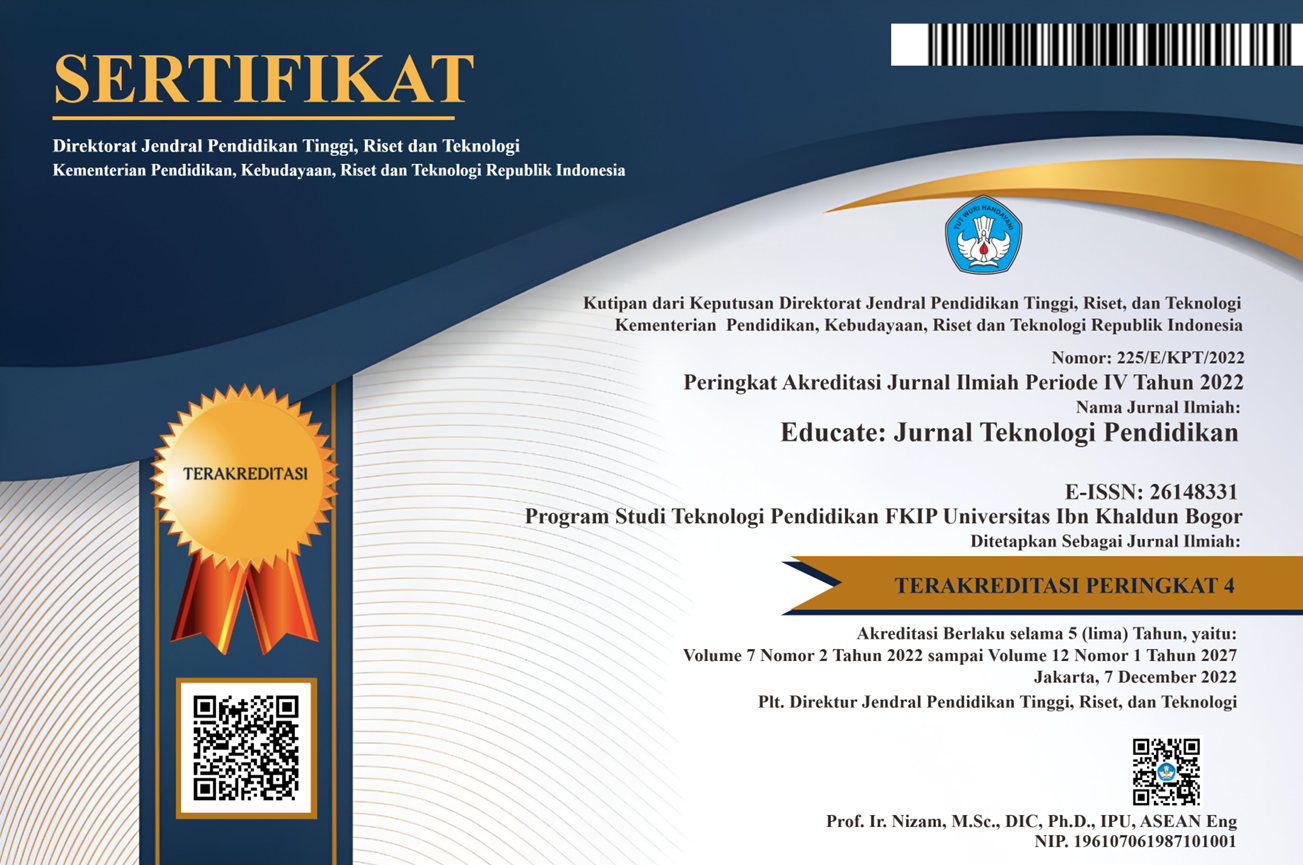The Implementation of PASS (Planning, Attention-Arousal, Simultaneous, Successive Processes) Intelligence Theory in Education
DOI:
https://doi.org/10.32832/educate.v8i02.14236Keywords:
asesmen pembelajaran, kecerdasan, pendidikan, teori PASSAbstract
When students start their journey of learning in the school, they often associated with IQ scores which is assumed that this does not fully depict students’ cognitive processes involved in learning. Assessment based on PASS theory is considered more capable of meeting the learning needs in the classroom as it can identify the diverse needs of students. The purpose of this study is to investigate the PASS-theory implementation in educational scope. This study method uses literature review which is the resources are from relevant journal articles and book discussing the PASS theory of intelligence. The implication of PASS theory in education are the importance of recognizing students’ strengths and weaknesses in each cognitive process in order to provide effective teaching and facilitate their optimal intelligence development. Therefore, the PASS theory makes a significant contribution to redesigning intelligence assessment and creating more personalized and effective teaching
References
Boden, C., & Kirby, J. R. (1995). Successive processing, phonological coding, and the remediation of reading. Journal of Cognitive Education. Journal of Cognitive Education, 4, 19–32.
Das, J. P. (1980). Planning: Theoretical considerations and empirical evidence. Psychological Research, 41(2–3), 141–151. https://doi.org/10.1007/BF00308652
Das, J. P. (1999). A neo-Lurian approach to assessment and remediation. Neuropsychology Review, 9, 107–116. https://doi.org/https://doi.org/10.1023/A:1025611924842
Das, J. P. (2001). Reading difficulties and dyslexia. Sarka Educational Resources.
Das, J. P., & Abbott, J. (1995). PASS: An Alternative Approach to Intelligence. Psychology and Developing Societies, 7(2), 155–183. https://doi.org/10.1177/097133369500700204
Das, J. P., Naglieri, J. A., & Kirby, J. R. (1994). Assessment of cognitive processes. Allyn & Bacon.
Fink, A. (2014). Conducting research literature reviews: From the internet to paper. SAGE Publications Inc.
Kranzler, J. H., & Keith, T. Z. (1999). Independent Confirmatory Factor Analysis of the Cognitive Assessment System (CAS): What Does the CAS Measure? School Psychology Review, 28(1), 117–144. https://doi.org/10.1080/02796015.1999.12085952
Kroesbergen, E. H., Van Luit, J. E., & Van Viersen, S. (2015). PASS theory and special educational needs: A European perspective. In Cognition, intelligence, and achievement. Academic Press.
Luria, A. R. (1966). Higher Cortical Functions in Man. Basic Books.
Luria, A. R. (1973). The working brain. Basic Books.
Luria, A. R. (1980). Higher cortical functions in man (2nd ed.). Basic Books.
Luria, A. R. (1982). Language and cognition. Wiley.
Miles, M. B., Huberman, A. M., & Saldana, J. (2013). Qualitative data analysis: A methods sourcebook. SAGE Publications Inc.
Naglieri, J. A., & Das, J. P. (2002). Practical implications of general intelligence and PASS cognitive processes. In The general factor of intelligence: How general is it? Erlbaum.
Naglieri, J. A., & Das, J. P. (1988). Planning-arousal-simultaneous-successive (PASS): A model for assessment. Journal of School Psychology, 26(1), 35–48. https://doi.org/10.1016/0022-4405(88)90030-1
Naglieri, J. A., & Das, J. P. (2005). Planning, Attention, Simultaneous, Successive (PASS) Theory: A Revision of the Concept of Intelligence. In Contemporary Intellectual Assessment: Theories, Tests, and Issues. Guilford Press.
Naglieri, J. A., Das, J. P., & Goldstein, S. (2012). Planning, attention, simultaneous, successive: A cognitive-processing-based theory of intelligence. In Contemporary intellectual assessment: Theories, tests, and issues. Guilford Press.
Naglieri, J. A., & Gottling, S. H. (1997). Mathematics Instruction and PASS Cognitive Processes. Journal of Learning Disabilities, 30(5), 513–520. https://doi.org/10.1177/002221949703000507
Naglieri, J. A., & Johnson, D. (2000). Effectiveness of a Cognitive Strategy Intervention in Improving Arithmetic Computation Based on the PASS Theory. Journal of Learning Disabilities, 33(6), 591–597. https://doi.org/10.1177/002221940003300607
Nishanimut, S. P., & Padakannaya, P. (2014). Cognitive Assessment System (CAS): A Review. Psychological Studies, 59(4), 345–350. https://doi.org/10.1007/s12646-014-0253-y
Parrila, R. K., Das, J. P., Kendrick, M. E., Papadopoulos, T. C., & Kirby, J. R. (2000). Efficacy of a Cognitive Reading Remediation Program For At-Risk Children in Grade 1. Journal of Cognitive Education and Psychology, 1(2), 114–139. https://doi.org/10.1891/194589500787383562
Rijumol, K. C., Thangarajathi, S., & Ananthasayanam, R. (2010). The PASS theory of cognitive processing. Journal on Educational Psychology, 3(4), 51–55.
Swanson, H. L. (2015). Intelligence, Working Memory, and Learning Disabilities. In Cognition, Intelligence, and Achievement (pp. 175–196). Elsevier. https://doi.org/10.1016/B978-0-12-410388-7.00010-5
Wang, X., Georgiou, G. K., & Das, J. P. (2012). Examining the effects of PASS cognitive processes on Chinese reading accuracy and fluency. Learning and Individual Differences, 22(1), 139–143. https://doi.org/10.1016/j.lindif.2011.11.006
Downloads
Published
How to Cite
Issue
Section
License
Copyright (c) 2023 Muhammad Fikri Pratama, Anggiet Noviana Puteri, Fitri Andriani

This work is licensed under a Creative Commons Attribution 4.0 International License.
| Authors grant the journal copyright of the work licensed under CC-BY-SA or The Creative Commons Attribution–ShareAlike License that allows others to share the work with an acknowledgement of the work's authorship and initial publication in this journal. | Penulis memberikan hak cipta karyanya kepada jurnal yang dilisensikan dengan CC-BY-SA or The Creative Commons Attribution–ShareAlike License yang memungkinkan orang lain untuk menggunakan karya dengan pengakuan kepengarangan karya dan publikasi awal dalam jurnal ini. |









